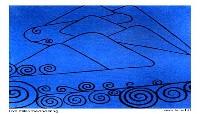One thing that I find interesting about the Romantic period in literature is the experimentation with opium by many poets as well as writers of prose, to induce a euphoric state in which to attain a “new level of consciousness”. Opium had a profound inspirational effect on Samuel Taylor Coleridge when creating his poem of mystery and magic, Kubla Khan. “The Romantic interest in the usual modes of experience” as described in Wordsworth’s fifth principle in the preface to the Lyrical Ballads, caused poets to explore “visionary states of consciousness." Coleridge experimented with this “altered consciousness and distorted perception” while under the influence of opium.
Kubla Khan is subtitled, A Vision in a Dream. A Fragment. The subtitle itself verifies that the poem was written “as a psychological curiosity, than one ground of any supposed poetic merits.” It is amazing to me that Coleridge could produce such a magnificent piece of writing after just awakening from a drug-induced “profound sleep."
The results are mind-boggling! Throughout the poem, Coleridge has made the ordinary seem mystical and magical as when he describes scenes of nature. He writes, “Five miles meandering with a mazy motion/ Through the wood and dale the sacred river ran,/ Then reached the caverns measureless to man”. He has also added superstition and demonology to impress upon the reader the sense of “occult powers and unknown modes of being.” The poem, Kubla Khan, provides glimpses of the occult and supernatural in the second stanza when Coleridge writes: “But oh! that deep romantic chasm which slanted/ Down the green hill athwart a cenarn cover!/ A savage place! As hold and enchanted/ As e’er beneath a waning moon was haunted/ By woman wailing for her demon lover!” Superstition and supernatural are also expressed in the poem’s final haunting lines which follows: “His flashing eyes, his floating hair!/ Weave a circle round him thrice,/ And close your eyes with holy dread,/ For he on honeydew hath fed,/ And drunk the mild of Paradise.”
This guy was really trippin' !
***************************************************
Below is the poem in its entirety:
Kubla Khan
A Vision in a Dream. A Fragment.
by Samuel Taylor Coleridge
- In Xanadu did Kubla Khan
A stately pleasure-dome decree :
Where Alph, the sacred river, ran
Through caverns measureless to man - Down to a sunless sea.
- So twice five miles of fertile ground
With walls and towers were girdled round :
And there were gardens bright with sinuous rills,
Where blossomed many an incense-bearing tree ;
And here were forests ancient as the hills,
Enfolding sunny spots of greenery. -
But oh ! that deep romantic chasm which slanted
Down the green hill athwart a cedarn cover !
A savage place ! as holy and enchanted
As e'er beneath a waning moon was haunted
By woman wailing for her demon-lover !
And from this chasm, with ceaseless turmoil seething,
As if this earth in fast thick pants were breathing,
A mighty fountain momently was forced :
Amid whose swift half-intermitted burst
Huge fragments vaulted like rebounding hail,
Or chaffy grain beneath the thresher's flail :
And 'mid these dancing rocks at once and ever
It flung up momently the sacred river.
Five miles meandering with a mazy motion
Through wood and dale the sacred river ran,
Then reached the caverns measureless to man,
And sank in tumult to a lifeless ocean :
And 'mid this tumult Kubla heard from far
Ancestral voices prophesying war ! - The shadow of the dome of pleasure
Floated midway on the waves ;
Where was heard the mingled measure
From the fountain and the caves. - It was a miracle of rare device,
A sunny pleasure-dome with caves of ice ! - A damsel with a dulcimer
In a vision once I saw :
It was an Abyssinian maid,
And on her dulcimer she played,
Singing of Mount Abora.
Could I revive within me
Her symphony and song,
To such a deep delight 'twould win me, - That with music long and loud,
I would build that dome in air,
That sunny dome ! those caves of ice !
And all who heard should see them there,
And all should cry, Beware ! Beware !
His flashing eyes, his floating hair !
Weave a circle round him thrice,
And close your eyes with holy dread,
For he on honey-dew hath fed,
And drunk the milk of Paradise.




No comments:
Post a Comment